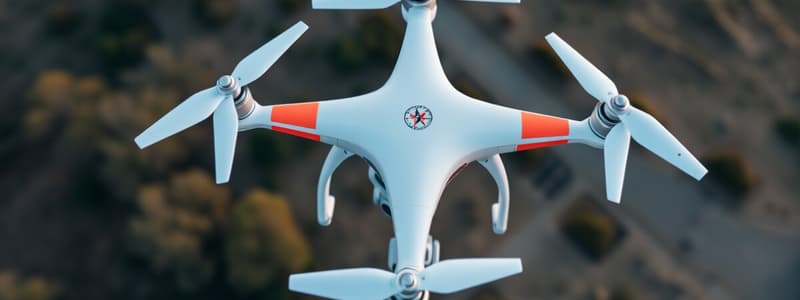Podcast
Questions and Answers
What is the recommended distance for conducting compass calibration during flight?
What is the recommended distance for conducting compass calibration during flight?
- More than 20 miles from the previous location
- More than 30 miles from the previous location (correct)
- Within 10 miles of the previous location
- Only when landing
Where should you ideally perform compass calibration to ensure minimal interference?
Where should you ideally perform compass calibration to ensure minimal interference?
- In open areas like grass or dirt (correct)
- In crowded urban areas
- Over bridge structures
- Near large metallic objects
What is the correct flight mode sequence to initiate the calibration process?
What is the correct flight mode sequence to initiate the calibration process?
- Attitude (A) to Position (P) to Attitude (A) four times
- Position (P) to Holding (H) to Attitude (A) and back
- Attitude (A) to Mode (M) to Position (P) twice
- Position (P) to Attitude (A) and back to Position (P) four times (correct)
Which physical action is NOT part of the compass calibration process?
Which physical action is NOT part of the compass calibration process?
What indicates the completion of the compass calibration process?
What indicates the completion of the compass calibration process?
Compass calibration should only be conducted if flying more than 50 miles from the previous location.
Compass calibration should only be conducted if flying more than 50 miles from the previous location.
Calibration is best performed in open areas like grass or dirt to minimize interference.
Calibration is best performed in open areas like grass or dirt to minimize interference.
Switching the flight mode directly to Attitude (A) without going through Position (P) is sufficient for calibration.
Switching the flight mode directly to Attitude (A) without going through Position (P) is sufficient for calibration.
It is recommended to calibrate the compass near tall buildings to improve precision.
It is recommended to calibrate the compass near tall buildings to improve precision.
The process of compass calibration does not require the drone to be rotated in a full 360-degree circle.
The process of compass calibration does not require the drone to be rotated in a full 360-degree circle.
Flashcards are hidden until you start studying
Study Notes
Compass Calibration Overview
- Conduct compass calibration whenever flying more than 30 miles from the previous location for improved accuracy.
- Frequent calibrations are recommended for precise measurements.
Suitable Calibration Locations
- Best performed in open areas like grass or dirt to minimize interference.
- Avoid calibration near tall buildings, metallic objects, or magnetic fields to reduce errors.
- Not recommended over reinforced concrete or near other steel objects.
Calibration Process
- Utilize an efficient shortcut instead of navigating through menus to save time.
- Switch the flight mode from Position (P) to Attitude (A) and back to Position (P) four times to initiate calibration.
Physical Steps for Calibration
- Pick up the drone by its legs and hold it still.
- Rotate the drone in a full 360-degree circle while watching the indicator lights.
- Turn the drone on its side when the lights change color, continuing until strobing occurs.
- Completion of the process provides measurement of magnetic declination.
Compass Calibration Overview
- Perform compass calibration for flights exceeding 30 miles from the last flight location to enhance accuracy.
- Regular calibrations are essential for achieving precise navigation and measurement results.
Suitable Calibration Locations
- Ideal calibration spots are open fields like grass or dirt to minimize signal interference.
- Calibration should be avoided near tall structures, metal objects, or strong magnetic fields to prevent inaccuracies.
- Do not calibrate the drone over reinforced concrete or close to steel objects, as they can disrupt the process.
Calibration Process
- Use a shortcut to initiate calibration for efficiency instead of navigating through longer menu options.
- Switch the flight mode from Position (P) to Attitude (A), then revert back to Position (P) four times to start the calibration.
Physical Steps for Calibration
- Grasp the drone by its legs and ensure it remains stationary.
- Rotate the drone in a complete 360-degree circle while observing the indicator lights for changes.
- Once the lights change color, position the drone on its side and continue rotating until the lights begin to strobe.
- Completion of the calibration process allows for the assessment of magnetic declination, which is crucial for accurate flying.
Compass Calibration Overview
- Perform compass calibration for flights exceeding 30 miles from the last flight location to enhance accuracy.
- Regular calibrations are essential for achieving precise navigation and measurement results.
Suitable Calibration Locations
- Ideal calibration spots are open fields like grass or dirt to minimize signal interference.
- Calibration should be avoided near tall structures, metal objects, or strong magnetic fields to prevent inaccuracies.
- Do not calibrate the drone over reinforced concrete or close to steel objects, as they can disrupt the process.
Calibration Process
- Use a shortcut to initiate calibration for efficiency instead of navigating through longer menu options.
- Switch the flight mode from Position (P) to Attitude (A), then revert back to Position (P) four times to start the calibration.
Physical Steps for Calibration
- Grasp the drone by its legs and ensure it remains stationary.
- Rotate the drone in a complete 360-degree circle while observing the indicator lights for changes.
- Once the lights change color, position the drone on its side and continue rotating until the lights begin to strobe.
- Completion of the calibration process allows for the assessment of magnetic declination, which is crucial for accurate flying.
Studying That Suits You
Use AI to generate personalized quizzes and flashcards to suit your learning preferences.




